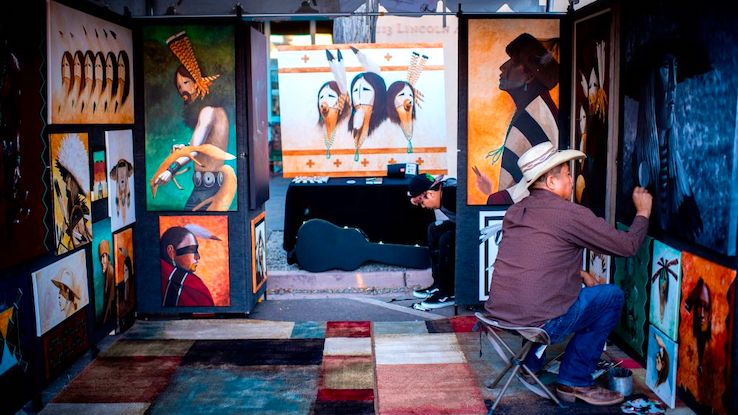
November is Native American Heritage Month — a time to elevate Indigenous voices and celebrate the diverse cultural traditions and histories of Native Americans and Alaska Natives. It’s also an important time to recognize the significant contributions Indigenous groups have made in enriching the cultural landscape of the United States. Visual art is just one of these contributions — one that continues to offer a powerful way to express and preserve cultural values and give context to traditions that make each group unique.
To mark this important observance, we’re sharing a collection of some of the top Indigenous artists working in the U.S. today. Each of the creators you’re about to meet comes from a different North American tribal nation, and each has developed an individual style worth honoring. While some masterfully carry on traditional art styles and forms passed down by elders, others have developed their own visions of what it means to be Indigenous in modern times — and all of their works are expressions of heritage and voices speaking important truths.
Barbara Teller Ornelas
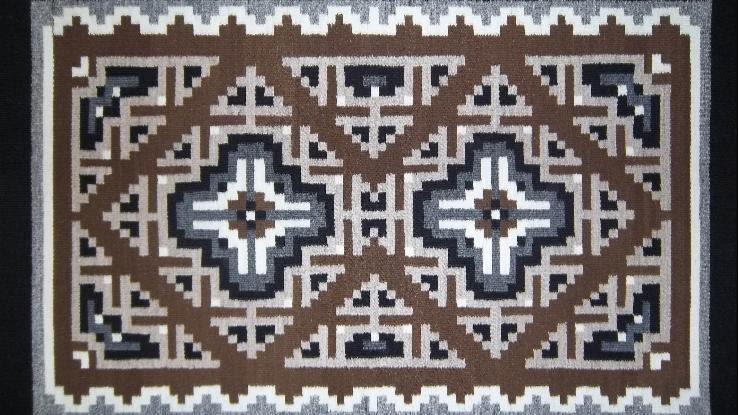
Barbara Teller Ornelas is a fifth-generation Navajo weaver who began learning her traditional art at just 8 years old. She grew up in New Mexico’s Two Grey Hills Trading Post alongside her father, who worked there for 40 years. Today, she’s a master of what’s become known as the Two Grey Hills style of weaving, which is recognized for its intricate geometric designs and use of naturally colored wool.
By incorporating both hard-carding and hand-spinning weaving techniques, Teller Ornelas carries on an artform that’s been part of the Navajo cultural legacy for centuries. She and her sister Lynda also teach weaving workshops to ensure the technique is passed down to future generations.
Nicholas Galanin
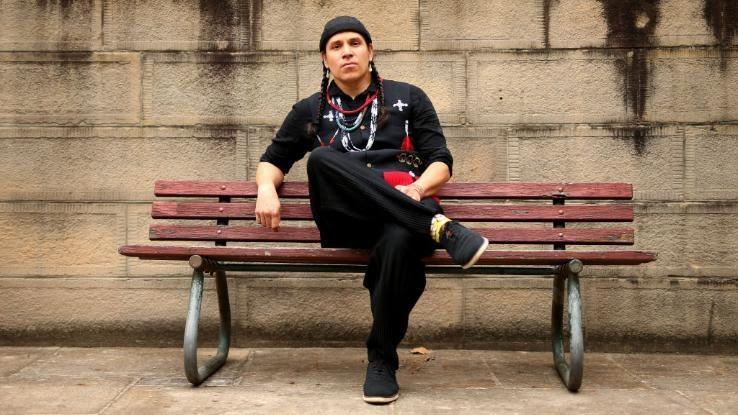
Nicholas Galanin is an artist whose work is refreshingly hard to pinpoint. An Alaskan creator of Tlingit and Unangax̂ ancestry, he expresses himself through sculpture, music, jewelry making and any other technique he chooses to harness to express what he’s feeling at the moment. His synthesis of methods exists in part because, for Galanin, both Indigenous art and his personal artistic vision are constantly evolving.
As Galanin himself puts it, “My process of creation is a constant pursuit of freedom and vision for the present and future. I use my work to explore adaptation, resilience, survival, dream, memory, cultural resurgence, and connection and disconnection to the land.” By uniting both traditional and contemporary styles, Galanin’s art is as fascinating as it is unique.
Duane Slick
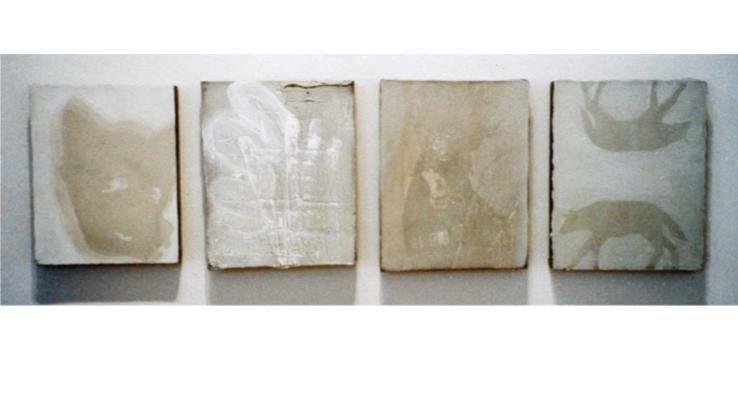
Duane Slick is a painter, teacher and storyteller of Meskwaki descent. One of the things that makes his paintings so unique is his varied choice in canvases — they tend to be glass or linen, both of which make for a visually striking and ethereal effect when combined with paint. He has described his work as “dream paintings whose aim is the exploration of matters spiritual, not physical.”
Slick’s subjects range from traditional Native American symbols to abstract patterns with realist elements. Not only has his work been widely exhibited, but he’s also been a teacher at the Rhode Island School of Design (RISD) since 1995.
Teri Greeves
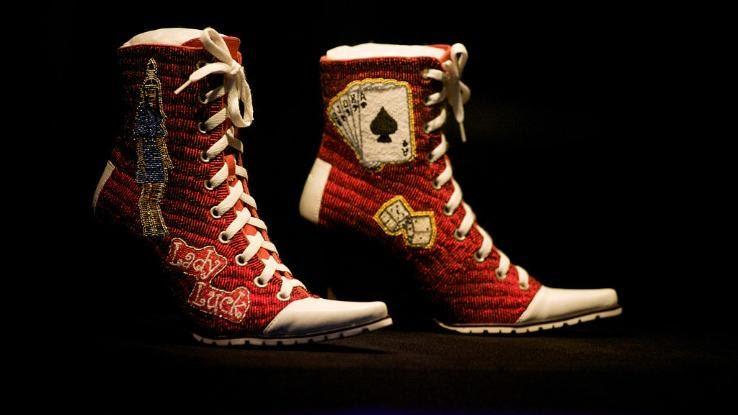
Teri Greeves is an artist of Kiowa descent, and to call her a beadworker doesn’t quite cover it. She currently lives in Santa Fe, New Mexico, where she transforms beads into magical works of art on everything from traditional Indigenous-style jewelry to modern shoes.
Greeves learned the art of beadworking from her mother and grandmother as a child, and her work has since been featured in magazines, on television, and in museums and exhibits all over the country. To learn more, take a look at her book Hearts of Our People: Native Women Artists, which explores both Greeves’ process and the extensive contributions and achievements of Indigenous women artists throughout American history.
Frank Buffalo Hyde
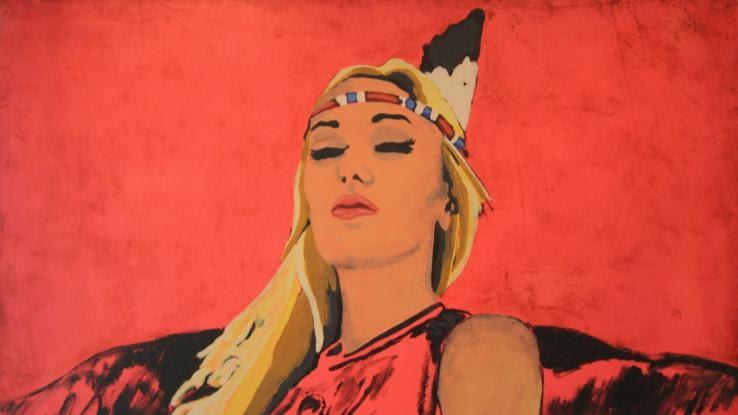
If you love colorful pieces with a modern edge, the art of Frank Buffalo Hyde is sure to capture your imagination. A member of the Onondaga Nation, he grew up on a reservation in New York and began exhibiting his work as a hobby at age 18. Hyde ultimately enrolled in the Institute of American Indian Arts, where he decided to turn his passion into a career.
Hyde’s work is a mixture of vibrant colors and a style that frequently incorporates elements of street art with Warhol-esque touches. His subjects range from traditional Indigenous figures to those from popular culture — and they sometimes encompass a stunning blend of the two.
Starr Hardridge
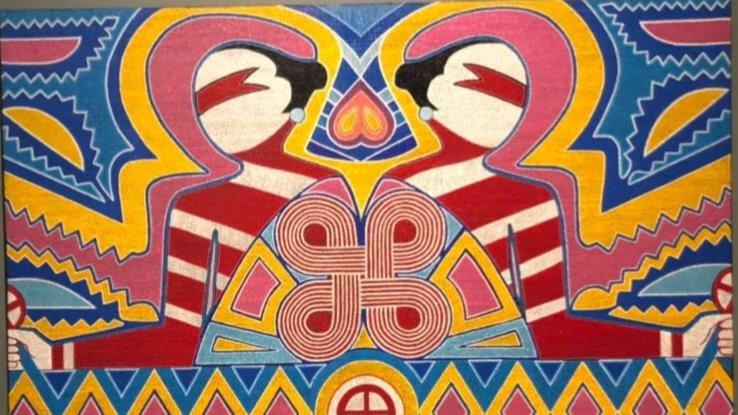
A citizen of the Muscogee Creek Nation, Starr Hardridge was raised in central Oklahoma. His vibrant work is a colorful blend of pointillism and beadwork aesthetic, which makes for a fascinating study in texture. According to his website, his work is “largely inspired by humanity’s search for balance within nature, featuring proud staples of traditional Muscogee mythology and culture.”
Hardridge also contributes to a series of paintings he calls “allegorical abstraction,” which blend Native American themes with modern abstract styles and a spectrum of bright, contrasting colors. He’s also a talented realism painter — a master of various styles who incorporates “modern twist[s] inspired by Muscogee patterns and designs” into each piece in unique ways.
Kay WalkingStick
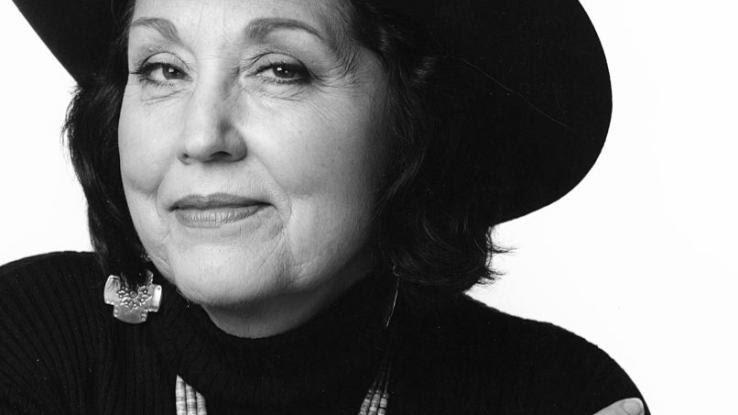
Kay WalkingStick is a member of the Cherokee Nation, and her connection to nature is undeniable in her beautiful landscape paintings. Her more recent works often utilize wood panels as canvases and mix oil landscapes with traditional Southwest Native American designs. By focusing on landscapes, Kay hopes to represent our shared heritage as citizens of Planet Earth.
“My wish has been to express our Native & non-native shared identity. We humans of all races are more alike than different, and it is this shared heritage, as well as my personal heritage I wish to express,” she explains in her artist statement.
Nocona Burgess
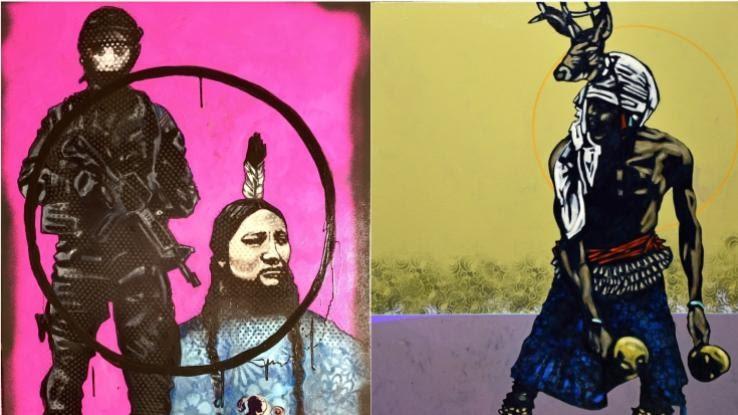
Nocona Burgess is a member of the Comanche Nation and the son of a former tribal chief who can trace his direct lineage back to revered Native American leader Chief Quanah Parker. After growing up surrounded by art — his father and grandmothers were creators — Burgess ultimately developed a style all his own.
Much of his work features Indigenous people portrayed in a colorful, modern style. His portfolio is filled with everything from acrylics on canvas to stencil paintings that blend elements of neo-graffiti with traditional Native American imagery. Burgess’ work has been exhibited in galleries around the world, and several of his pieces are part of the permanent collection of the Smithsonian Institute’s National Museum of the American Indian in Washington, D.C.






